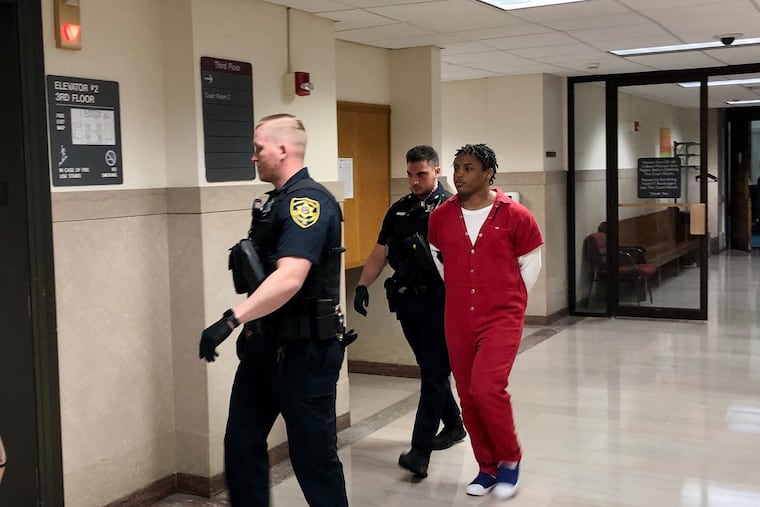A Pottstown man was sentenced to decades in state prison for killing his boyfriend and hiding the body
Keshaun Sheffield admitted to stabbing Rashid Young to death during an argument in 2019, and then burying his body in a shallow grave at an arboretum in East Germantown.

A Pottstown man was sentenced to 12½ to 30 years in state prison Wednesday after admitting he killed his boyfriend and buried his body in a shallow grave in a Philadelphia arboretum.
Keshaun Sheffield, 21, pleaded guilty to third-degree murder for fatally stabbing Rashid Young, 22, in 2019 during an argument in the Pottstown apartment they shared and hiding his body in a recycling bin. Sheffield later enlisted another man’s help in digging a makeshift grave in Awbury Arboretum, near his mother’s home in East Mount Airy.
(The man later told police Sheffield said he stabbed Young in self-defense, and that Young had pulled a knife on him first, according to court records.)
Sheffield, meanwhile, withdrew thousands of dollars from Young’s bank account, and drove his Honda Pilot SUV.
He hid the murder in part by duping Young’s family into believing he was still alive. Using Young’s phone and social media accounts, Sheffield sent texts and posted updates. Posing as Young, he sent abrasive, insulting messages to Young’s relatives, telling them he wanted nothing to do with them.
» READ MORE: ‘Find Rashid’: How a Philly lawyer’s quest to locate a former client helped solve his murder
Deputy District Attorney Tom McGoldrick said those messages of estrangement had a “tremendous impact” on Young’s family.
“The pain that that caused them was unfathomable, because it obviously wasn’t true,” he said. “And for the family to hear that, and [later] find out he was murdered, that just added to the pain that the family experienced.”
McGoldrick said Sheffield’s plea agreement was made in close consultation with the family and to spare them the difficulty and emotion of a trial.
“We’ll never exactly know what happened in that apartment on the day of the killing,” McGoldrick said.
Young’s mother, brothers and father, in emotional victim-impact statements, said his disappearance had pained them for years, and that the eventual revelation of his death had caused them to suffer even more.
“That was my little brother, that was my constant,” Young’s brother Anthony Dill-Word said. “If this was self-defense, I could take that, but the lengths you went through to send messages that my brother hated me ... that is why I can’t offer peace to you.”
Young’s mother, Kimberly Cyrus, said she had chosen to forgive Sheffield because she could not allow hatred to dominate her life.
“I can’t and won’t try to wrap my head around what you did and why you did it, because it’s too hard to do,” she told Sheffield. “But what I will do is move on.”
Sheffield declined to speak at the hearing. His attorney, Marni Jo Snyder, said he chose not to address the judge so that Young’s family “could feel like they were heard.”
Snyder said Young and Sheffield had a difficult relationship, argued frequently and sometimes got into physical fights.
Still, she said, “He lost someone that he really did love as well, and so he feels that pain. He certainly regrets every little thing of everything that happened. But as far as talking about those feelings, the complexity of that, for someone who was 17 at the time and is only 21 now, I think is not something that is easy to put words together.”
A month after Young’s death, a groundskeeper at the arboretum discovered his remains and contacted Philadelphia police. But the body sat unidentified in a city morgue for three years as the investigation stagnated.
Young’s family had filed a missing persons report in Pottstown. But police there never connected the dots to the body found in Philadelphia despite a key piece of evidence mere feet from the body: the recycling bin, which bore a serial number that traced back to the block where Young and Sheffield had lived in Pottstown.
It took two years before an attorney working with Young’s family helped solve his murder.
Nadeem Bezar, of Kline & Specter, had represented Young years earlier in a civil case that won the then-teenager a $2 million trust fund to settle a claim that he had been abused while living in a foster home. When Bezar learned that Young had abruptly stopped withdrawing money from that fund, he grew concerned.
With the assistance of two of his law students at Temple University and a private investigator, Bezar retraced Young’s final steps. They discovered that Sheffield was driving Young’s car, and had parked it outside his mother’s home in Philadelphia.
Armed with that and other evidence, Bezar contacted Montgomery County prosecutors, who began investigating Young’s disappearance as a criminal case and eventually solved the crime.